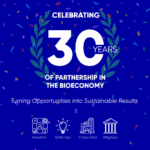Cellulosic Biomass Expert
Cellulose is the most abundant organic compound on earth with cellulosic biomass literally everywhere. It is a critical component of the cellular structure of plants and some bacteria excrete it as well. Cellulosic materials can be processed into many useful commodities, such as fuels, sugars, polymers, fibers and other chemicals. Though there are many routes to the end product, a common, low-energy route involves enzymatic hydrolysis with mechanical agitation. This can involve pretreatment with acids, bases or steam, or even purely mechanical treatment. The hydrolysis step can be configured as batch, fed batch or continuous. Percent solids feeding the reactor can range from about 8 to 30, depending on the reactor scheme, the feedstock, pretreatment method and the enzymes used. Feedstocks can be any low-value plant matter. Examples of feedstocks that have been successfully employed include municipal solid waste, corn stover, corn fiber, sugar cane, energy cane, beet fiber, switchgrass, ground wood and many others. Lee Enterprise consulting can help you navigate through the decisions of process type, feedstock and agitation issues for a successful process.
It is no wonder why it is the subject of so many diverse methods of conversion into so many different products. It is vitally important to the sustainable growth of our bioeconomy both here and abroad. This is where the cellulosic biomass expert comes in. This type of expert may help clients determine:
- What are the best plants to produce the necessary cellulose for a conversion project?
- What should the supply chain for the cellulosic biomass look like?
- What are all the competing uses for these materials in the particular market place?
- Which cellulosic plants or bacteria match up with which conversion methods best?
- What are the various conversions methods and how do they work?
- Where or can these materials add value to your existing business?
Large renewable energy and biochemical consulting firms like LEC Partners normally offer a wide range of services in biofuels, biochemicals, biotechnologies, biomaterials, synthetic biology commercialization, feedstocks, and hemp/cannabis. These companies should have business and financial services like due diligence, feedstock availability, grants and loans and bio market research. The company also offers technical and engineering related services like techno economic analysis, environmental evaluations, feasibility studies, risk analysis and expert witness engagements. They might also have strategic partnerships in place to assist clients with insurance, legal, accounting, plant fabrication, feedstock procurement.
With over 150 experts worldwide, LEC Partners has experts in many specific clean and renewable areas, including anaerobic digestion, fermentation, biomass, conversion technologies for things like tires and railroad ties, organic synthesis, fuel additives, ethanol gas, biodiesel fuel including algae biofuels, solid state and industrial fermentation, green energy grants, ag biotech, agricultural waste, alcohol fuels, alternative proteins and animal-free products, sustainable foods, beverage fermentation, biocatalysis, biodiesel conversion, biogas production, biomass power, carbon intensity, co2 utilization, combined heat & power, Fischer-Tropsch technology, food waste, hydrothermal carbonization, industrial enzymes, landfill management, microbial fermentation, organic synthesis, plastic pyrolysis, plastic recycling, plastic waste, pyrolysis oil, reactor design, renewable identification number, the Renewable Fuel Standard (rfs2), solid recovered fuels, torrefaction and torrefied biomass, waste to energy, and waste-to-hydrogen. This is a multidisciplinary group of green energy consultants that is a virtual “one stop shop” for any client need and handles projects of all types and sizes.
Look at our experts and the services we provide. Most of our experts are also available to advise and serve as expert witnesses in bioeconomy litigation matters. For the larger projects, we specialize in putting together full service, interdisciplinary teams with one point of contact. See video about LEC here. Call us at 1+ (501) 833-8511 or email us for more information.
Have some questions?
Not sure where to start?
Let's start a conversation. We're here to help you navigate
the bioeconomy with confidence.

